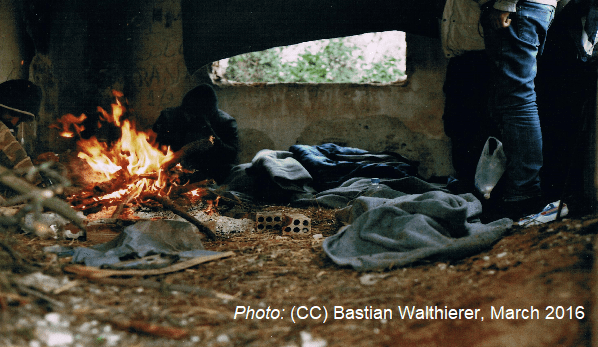As temperatures drop below zero, about 2,500 people are sleeping rough in the northwest of Bosnia and Herzegovina (BiH) of which several hundreds remain in squalid conditions at the burned-down Lipa camp that was destroyed by a fire on 23 December. While housing capacities and sufficient funding exist, political disagreement between local and national authorities perpetuate this humanitarian crisis.
For months, thousands of people have faced inhumane living conditions in the northwest of BiH, more than a thousand in the Lipa camp not prepared for winter, as earlier reported by ECRE. Over the past two weeks, the situation has become even worse. After repeated alerts over the unbearable conditions at Lipa camp that lacked basic supplies such as power and water supply, IOM which was running the site proceeded with closing it down on 23 December. In this process, a fire broke out and destroyed the camp almost completely. According to the grassroot organisation No Name Kitchen, supporting people on the move in the area, no physical injuries were caused by the fire. However, the living conditions of about 2,500 people remain life threatening.
Following the fire, many of the former camp residents tried to reach Bihac, but when authorities blocked the road they returned to the burned-down camp or dispersed into the surrounding forest. Two days after the fire, it began to snow and temperatures dropped below zero. A number of organisations are distributing food, sleeping bags and other basic necessities.
A video filmed by a resident and published by No Name Kitchen shows the squalid conditions people face at the burned-down Lipa camp. Toilet containers – one of the few things that had not been destroyed by the fire – are being used as sleeping places and makeshift tents have been built from tarps. “We are also humans, we are not animals but they are considering us like we were animals”, states the videographer denouncing the inaction of authorities. Photos of protests over the dire situation circulated the internet and on 1 January, several hundred people went into hunger strike.
The European Commission pledged €3.5 Mio in humanitarian assistance which comes on top of €4.5 million allocated in April 2020 and brings EU humanitarian assistance for refugees and migrants in BiH to €13.8 million since 2018. However, it is not a lack of funding that prevents a solution to the current humanitarian disaster, but “the inability of the Bosnian political system” unable to agree on the location of accommodation, Western Balkans co-ordinator for the International Organization for Migration (IOM) Peter van der Auweraert emphasised. According to him, two accommodation centres could be operational within 24 hours to provide shelter to all sleeping rough, but due to political resistance at the local level nothing is happening.
On 29 December, 900 people spent the night in buses following a failed attempt to relocate them to a former military site in the village of Bradina, 250km south of Lipa camp. Villagers and local politicians had protested the relocation and after hours in the busses, everyone returned to the burned-down camp site.
Now, authorities in BiH are setting up new provisional accommodation for people stranded at the site. Tents set up by the military last week are being equipped with mattresses Deutsche Welle reports and according to Van der Auweraert, the tents will be ready for move-in on 8 January.
Director of European Affairs at ECRE member Pro Asyl, Karl Kopp, urges EU Member States to urgently evacuate people from BiH – but so far there have not been any relocation offers. “One can only understand Lipa and other ugly places when one sees that those seeking protection are systematically denied basic rights,” Kopp said in an interview with German newspaper Taz, adding “The people seeking protection are standing there in the mud because the EU has taken defensive measures that have brought them exactly there.”
About 70,000 people have travelled through BiH since it became a key transit corridor in 2018. But reaching the EU remains a dangerous and difficult endeavour and people on the move often face pushbacks and violence at the hands of Croatian police who patrol the country’s external EU borders with BiH. In December, the Border Violence Monitoring Network compiled a 1,500-page ‘Black Book’ that documents the horrific violence suffered by over 12,000 people at the hands of authorities on the EU’s external borders. It collects hundreds of testimonies of migrants and asylum seekers who have experienced push backs and other human rights violations.
For further information:
- ECRE, Bosnia and Herzegovina: Snowfall Increases Hardships of People Stuck in Europe’s Borderlands, December 2020
- ECRE, Austria: Chain Pushbacks to Bosnia Amid Growing Evidence of Widespread Abuse in the Balkans, November 2020
- ECRE, Balkans: Ombudsman Investigates Commission’s Possible Failures Regarding Abuse at Croatian Border, Absurdity within Hungary’s Asylum System, Bosnia and Herzegovina Signed Readmission Agreement with Pakistan, November 2020
- ECRE, Balkans: New Brutal Pushbacks from Croatia to Bosnia, where a Humanitarian Crisis Unfolds, October 2020
- ECRE, BVMN: Report on Illegal Pushbacks and Border Violence in the Balkan Region, October 2020
- ECRE, Balkan Route: Thousands Stuck at External EU Borders Face Destitution and Violence from Locals and Those Keeping the Gate Closed, October 2020
- ECRE, Balkans: Continued Pushbacks and the Formation of a Paramilitary Practice at the Southern Borders, September 2020
- ECRE, Things are Heating up along the Balkan Route, September 2020
- ECRE, Balkans: New Report Details Illegal Pushbacks and Border Violence, August 2020
- ECRE, Slovenia Plans New Barriers at the Border while Pushbacks and Violence Continue Across the Balkans, April 2020
- ECRE, Balkans: New Protests Along the EU Borders, February 2020
- ECRE, Croatia: New Report on Torture of Asylum Seekers by Authorities, January 2020
- ECRE, Shots Fired, Arrests and Violent Push Back Reported at the Serbian Hungarian Border, January 2020
Photo: (CC) Bastian Walthierer, March 2016
This article appeared in the ECRE Weekly Bulletin. You can subscribe to the Weekly Bulletin here.

